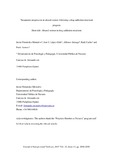Mostrar el registro sencillo del ítem
Therapeutic progression in abused women following a drug-addiction treatment program
| dc.creator | Fernández-Montalvo, Javier | es_ES |
| dc.creator | López-Goñi, José Javier | es_ES |
| dc.creator | Arteaga Olleta, Alfonso | es_ES |
| dc.creator | Cacho Fernández, Raúl | es_ES |
| dc.creator | Azanza Álvarez, Paula | es_ES |
| dc.date.accessioned | 2018-03-20T18:19:28Z | |
| dc.date.available | 2018-03-20T18:19:28Z | |
| dc.date.issued | 2017 | |
| dc.identifier.issn | 0886-2605 (Print) | |
| dc.identifier.issn | 1552-6518 (Electronic) | |
| dc.identifier.uri | https://hdl.handle.net/2454/27985 | |
| dc.description.abstract | This study explored the prevalence of victims of abuse and the therapeutic progression among women who sought treatment for drug addiction. A sample of 180 addicted Spanish women was assessed. Information was collected on the patients’ lifetime history of abuse (psychological, physical and/or sexual), socio-demographic factors, consumption variables and psychological symptoms. Of the total sample, 74.4% (n = 134) of the addicted women had been victims of abuse. Psychological abuse affected 66.1% (n = 119) of the patients, followed by physical abuse (51.7%; n = 93) and sexual abuse (31.7%; n = 57). Compared with patients who had not been abused, the addicted women with histories of victimisation scored significantly higher on several EuropASI and psychological variables. Specifically, physical abuse and sexual abuse were related to higher levels of severity of addiction. Regarding therapeutic progression, the highest rate of dropout was observed among victims of sexual abuse (63.5%; n = 33), followed by victims of physical abuse (48.9%; n = 23). Multivariate analysis showed that medical and family areas of the EuropASI, as well as violence problems and suicide ideation, were the main variables related to physical and/or sexual abuse. Moreover, women without abuse and with fewer family problems presented the higher probability of treatment completion. The implications of these results for further research and clinical practice are discussed. | en |
| dc.format.mimetype | application/pdf | en |
| dc.language.iso | eng | en |
| dc.publisher | SAGE Publications | en |
| dc.relation.ispartof | Journal of Interpersonal Violence, Vol. 32, Issue 13, pp. 2046-2056 | en |
| dc.rights | © 2017 SAGE Publications | en |
| dc.subject | Lifetime abuse | en |
| dc.subject | Women | en |
| dc.subject | Treatment progression | en |
| dc.subject | Dropout | en |
| dc.subject | Drug addiction | en |
| dc.title | Therapeutic progression in abused women following a drug-addiction treatment program | en |
| dc.type | Artículo / Artikulua | es |
| dc.type | info:eu-repo/semantics/article | en |
| dc.contributor.department | Psicología y Pedagogía | es_ES |
| dc.contributor.department | Psikologia eta Pedagogia | eu |
| dc.rights.accessRights | Acceso abierto / Sarbide irekia | es |
| dc.rights.accessRights | info:eu-repo/semantics/openAccess | en |
| dc.identifier.doi | 10.1177/0886260515591980 | |
| dc.relation.publisherversion | https://doi.org/10.1177/0886260515591980 | |
| dc.type.version | Versión aceptada / Onetsi den bertsioa | es |
| dc.type.version | info:eu-repo/semantics/acceptedVersion | en |


